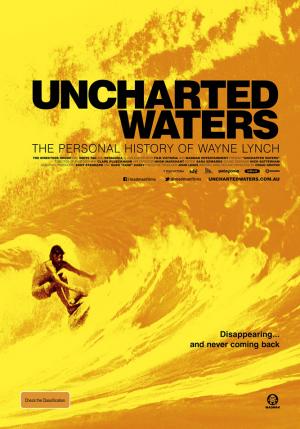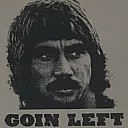Uncharted Waters: The Personal History of Wayne Lynch

“Why did you let the movie be made about you?”
It's not often I enjoy post-film Q&A sessions, yet this question, the first one asked after the premiere of Uncharted Waters at the Melbourne Film Festival, hit the mark. Why did Wayne Lynch, counter-cultural hero and noted shirker of the media spotlight, allow this film to be made?
Wayne, standing onstage at ACMI looked momentarily stumped. If he thought this was going to be an easy crowd he was wrong. “I'll let Craig answer that,” he said, quickly stepping aside for the film's director, Craig Griffin. And, just like that, Wayne Lynch shifted himself out of the spotlight.
Uncharted Waters is a fan's film – straight up. It makes no pretense of being otherwise. When you're a grommet you get your idol's autograph, when you're older, and if you have the means and the talent, you make a documentary about them. And that's what Craig Griffin has done. There's nothing inherently wrong with films of this nature - passion and enthusiasm for the subject is essential for any filmmaker – yet the risk is that the result becomes a mere hagiography. Which, if it were the case, would run contrary to many of the values Wayne Lynch stood for. Humility for one.
So again, why did Wayne Lynch allow this film to be made? Craig Griffin answered on behalf of Wayne: “It took many visits and months of persuasion, and also an agreement that he'd have a hand in the outcome.”
*****
Uncharted Waters begins, ironically enough, by cruising through heavily charted waters. The opening sequence features familiar clips of Wayne surfing, highlights from his many film appearances, overlaid with surfing commentators lionising Saint Wayne. All of them deliver lofty praise – so far, so predictable. However, as the flow of the movie establishes itself, the quotes begin to appear randomly, interspersed between the main narration without any attribution. The anonymous praise parsed through a loose contextual framework.
It's a clever device, the effect of which is disorientating. Let the viewer put themselves in Wayne's shoes a moment: Is that how it feels when the surf media starts labelling you the next Messiah? Unfamiliar voices begin to speak intimately on your behalf, creating a persona that doesn't match reality as you understand it?
In his very first interview 15-year-old Wayne is fed a clearly baited question by John Witzig. “How do you compare yourself to Peter Drouyn?” asks the Sydney journalist who's hoping to rouse Lynch's ego and score a notable quote.
“I don't,” is the gruff reply. He may have been young and country raised, but Wayne Lynch was not naïve. His distrust of the media and celebrity was fostered at an early age.
Despite his media reluctance Lynch is drawn further into the spotlight, he was simply too talented not to. The combination of precocious talent with everyman personality – as one commentator says: “There's 300 people out at Rincon and they all think they're Wayne Lynch" – and the 1970s surfing public was enthralled. And the more they wanted to find out about Lynch the more of a guard he put up, raising yet more curiousity in a self-stoking cycle of fame and contradiction.
So although Wayne dodged the spotlight on the stage I assume this is why he let Uncharted Waters be made. With enough distance between then and now, and a hand in the outcome, thereby circumventing the sycophantic surf media, he finally has an opportunity to have his say; to speak on his own behalf.
Part of the appeal of Wayne Lynch is how he responded to the conflicts in his life. Vietnam is the obvious one, it's not a new story but well retold in Uncharted Waters. The richer vein, however, is Lynch's conflicted feelings toward the structures that supported him: the surf media, professional surfing, and the corporate companies that paid his wages.
They weren't relationships that sat easily with him and in Uncharted Waters he has a chance to expand on why. The answers aren't always as satisfactory as hoped, but he offers more than he ever has before. White Australia's treatment of Aboriginals is another relationship that doesn't sit well. It leads him away from the coast to Central Australia, photos from the Lynch family album enrich the story.
Conflict, it would seem, is one of the defining elements of Wayne Lynch's life. Conflict that was foisted upon him, such as Vietnam, and conflict that he sought, speaking up about injustices, all of which endeared him to the surfing public. Attempting to resolve these conflicts is one of Uncharted Waters best traits. Alongside the surfing of course, which is modern footage mixed with vintage Lynch.
He may be an unabashed fan of Wayne Lynch, yet Craig Griffin understood that his passion alone couldn't carry the film; human drama, and in this case, conflict, must also be present. And yeah, great surfing too.
Uncharted Waters: The personal history of Wayne Lynch will show at select cinemas from November 15th. Click here for details.


Comments
Hagiography - great word!